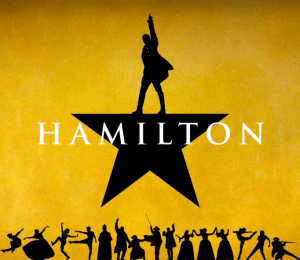It’s true: Hamilton totally earns the hype. My sweetheart treated me to a touring company performance of the musical here in Boston last night, and it was the first time either of us had seen it. It was a tour de force.
It’s a constantly moving, singing, dancing, quite literally spinning masterpiece of intricate physical, vocal and emotional involvement among cast, crew, musicians, choreographers, set designers and visionaries. Everything is held aloft by Lin-Manuel Miranda’s brilliant rhythm, rhyme, and lyrical passion and inspired by Hamilton biographer Ron Chernow’s erudition.
It starts with a pow and never slows down, and turntables within turntables spin against each other to allow for even more movement and multiple simultaneous stories to play out before your eyes.
There is very little spoken dialog separating the musical numbers—it’s a constantly flowing, beautifully paced river of rhythm, full of emotion yet always supported by a framework of fact, a propulsive political urgency and this historical imperative: Make this moment count. Make your vision real. Fight for what matters. Keep on trying. You can rest another day—acknowledge your power to make a difference right now and turn that potential power into positive action. It’s honest, with no holds barred: thrilling, merciful, inspiring.
Despite the show’s famously color-blind casting and incorporation of musical and rhythmic styles deeply influenced by modern Black and Latinx music, the musical does have problematic elements. Its most troubling aspect is that it celebrates several white Founding Fathers (like George Washington) who were racist enslavers. Some find largely positive portrayals of men like Washington, Burr, and Hamilton by Black or Latinx actors troubling because it makes the characters feel more relatable and sympathetic.
A number of thoughtful commentators consider Lin-Manuel Miranda complicit in whitewashing American history. This view does have some validity. Yet I also appreciate that Miranda explores Hamilton’s flawed behavior and his self-absorbed nature, and shows how pettily even revered founders behaved toward each other. He allows us to feel deeply conflicted about often likeable and sometimes noble people who also did shameful, even despicable things. Miranda’s musical also makes clear how the glorification of war and violence as a means to end differences or defend honor inevitably results in tragedy. And, of course, as a work of art, Hamilton is original, captivating, and sometimes deeply moving. It is flawed and sometimes troubling, like many important pieces of art. But it is art nonetheless.

